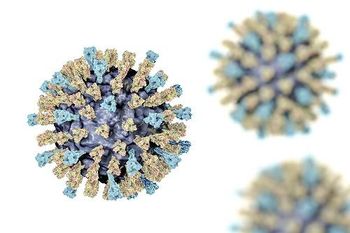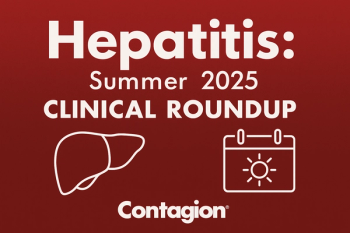
The Center for Discovery and Innovation’s chief scientific officer David Perlin, PhD, discusses the factors for the growing number of cases and the difficulties in developing such treatments.

The Center for Discovery and Innovation’s chief scientific officer David Perlin, PhD, discusses the factors for the growing number of cases and the difficulties in developing such treatments.

Through the bipartisan Cure Hepatitis C Act of 2025, legislation seeks to provide nationwide hepatitis C treatment and strengthen public health infrastructure by expanding testing, treatment, and prevention through a subscription-based model.

The center’s chief scientific officer David Perlin, PhD, provides some insights on the evolution of its antiviral program from its foundation in treating COVID-19 to addressing all pan-coronaviruses.

Your liver silently powers and protects your body every day, but untreated hepatitis infections, excessive alcohol, and poor diet can destroy its vital cells, leading to fatigue, cirrhosis, and liver cancer if not prevented through awareness and care.

The US Department of Agriculture’s Food Safety and Inspection Service (FSIS) provides information on the 2 companies recalls and the products.

William Schaffner, MD, provides more context to the committee’s vaccines recommendations.

Despite modest progress, Staphylococcus aureus bloodstream infections—particularly those caused by MRSA—remain a major cause of morbidity and mortality, underscoring the urgent need for novel, broad-spectrum treatments such as ceftobiprole that can address both resistant and susceptible strains.

This week, there are C diff and hepatitis roundup reports, how COVID-19 has disrupted traditional respiratory virus patterns with summer surges now preceding the typical winter influenza season, a review of a trial comparing dalbavancin with standard intravenous therapy for Staphylococcus aureus, and more.

University of Oregon researchers found that adding a common chemical, chlorate, to standard antibiotics made them up to 10,000 times more effective in lab tests against hard-to-treat bacteria, offering a potential breakthrough for chronic wound care.

Infections caused by NDM-producing carbapenem-resistant Enterobacterales have risen more than 4-fold since 2019, raising alarms about limited treatment options, delayed detection, and heightened risks of transmission and mortality in health care settings. TAXIS Pharmaceuticals Chief Scientific Officer Ajit Parhi, PhD, offers some insights on NDM-CRE, antimicrobial resistance, and an overview of his company’s pipeline.

Recce Pharmaceuticals has begun its study for this indication in Indonesia with its investigational product, RECCE 327 topical gel (R327G).

Stewardship programs that reduce initial use of extended-spectrum antibiotics appear to influence antibiotic choice throughout hospitalization.

Low vaccination rates did not rise sufficiently to attain "herd immunity" after a measles outbreak in a region in which it had been eliminated.

Multicenter study will measure efficacy, safety, and immunogenicity in adults 18–59 across Europe.

Jacinda Abdul-Mutakabbir, PharmD, MPH, describes the university's atmosphere, students' involvement in community-based care, and the support they receive.

A June–September roundup spanning hepatitis research and surveillance data, FDA and ACIP policy moves, diet and diagnostics insights, and pipeline updates from screening innovations to HBV/HDV/HCV trials and approvals.

William Schaffner, MD, reviews clinical workup, treatment, and preventative measurements.

A June–September C diff roundup spanning diagnostics and stewardship debates, microbiome-based therapies and FMT optimization, prevention trials and funding, real-world outcomes, and persistent gaps in clinician practice and public awareness.

The 2025 ATS guidelines for community-acquired pneumonia update recommendations on imaging, antibiotic use, treatment duration, and corticosteroid use, emphasizing lung ultrasound as an alternative diagnostic tool, more selective empiric antibiotic prescribing, shorter courses of antibiotics for stable patients, and limited use of corticosteroids to severe inpatient cases.

This week, review of ACIP’s latest decisions, analysis links food insecurity with higher long COVID risk, and advocacy for immune-informed antibiotic development with updated susceptibility testing.

This newly approved long-acting injectable PrEP offers 6 months of HIV protection, and represents a major scientific and policy breakthrough. However, its success will depend on ensuring equitable access, enforcing coverage requirements, and maintaining a robust, multi-faceted HIV prevention infrastructure amid political and systemic challenges.

Nimish Patel, PharmD, discusses UC San Diego’s care offerings in HIV, the challenges of getting care to marginalized populations, and what the addition of lenacapavir means to individuals looking to access PrEP.

Environmental modeling shows inpatient IV therapy has the highest carbon, water, and waste footprint, while OPAT offers major reductions.

Jennifer Le, PharmD, MAS, FIDSA, FCCP, FCSHP, discusses her collaboration on this innovative work with this therapy in severely ill children.

Episode 2, Part 4, Robert Bransfield, MD, connects neural circuits, inflammatory responses to infection, and impulsivity in violent behavior.

Georges C.Benjamin, MD, executive director of the American Public Health Association, details practical implications for clinical teams.

Although the number of people with knowledge about the infection rose, the results demonstrate a continued need for further education and awareness among the public.

Jennifer Le, PharmD, MAS, FIDSA, FCCP, FCSHP, talks about her work on the 2020 vancomycin guidelines for children as well as her efforts to implement Bayesian therapeutic drug monitoring for children in Vietnam.

A CDC report links the rapid growth of NDM-CRE to testing gaps and urges the prompt use of carbapenemase testing, mechanism-guided therapy, and stronger infection prevention measures.

Part 2 on coverage across payers, evidence needs for COVID-19, hepatitis B, and MMRV, and clinician messaging for maternal and newborn protection.